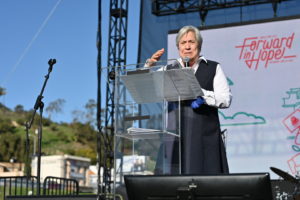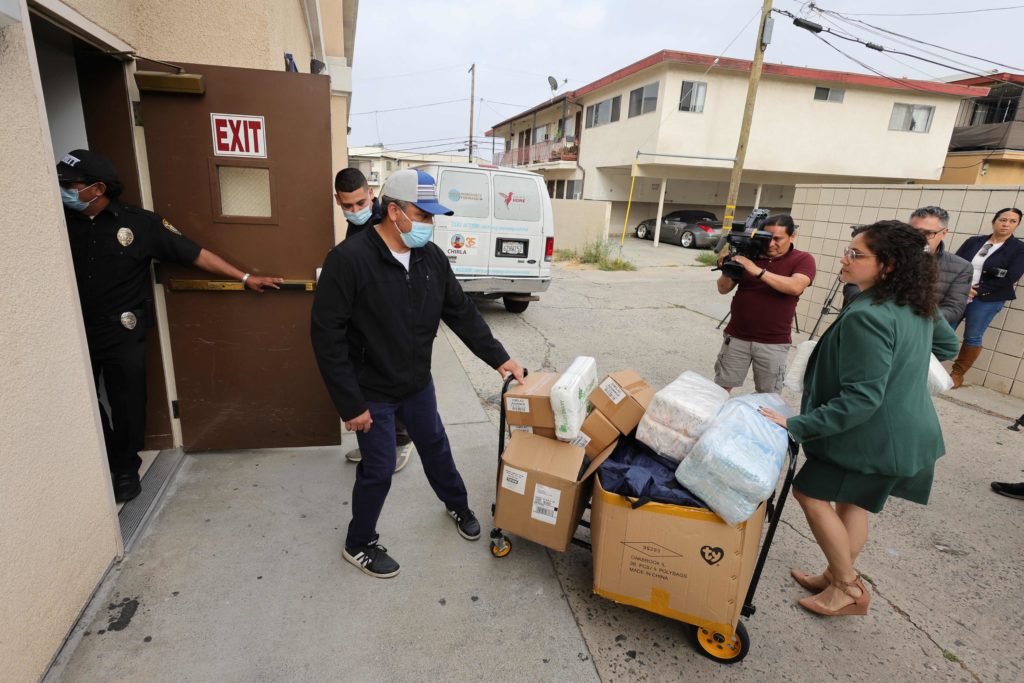Nearly two weeks after seeing charter flights with migrants flown from Florida and dropped off in California’s capital city, Sacramento, in early June, the members of Coalition for Humane Immigrant Rights (CHIRLA) in Los Angeles received word that a bus full of asylum-seekers had left Texas and was heading their way.
Two weeks later, another bus full of migrants arrived. Two weeks after that, on July 13, it happened again.
In each case, despite the anxiety, the media attention, and the politics, the group was prepared.
That’s because CHIRLA — along with the Archdiocese of Los Angeles, Central American Resource Center (CARECEN), Immigrant Defenders Law Center, Esperanza Immigrant Rights Project, Clergy and Laity United for Economic Justice (CLUE), city and county officials — had been meeting since 2022 to prepare for these exact scenarios.
“We were all in it together,” said Jorge-Mario Cabrera, CHIRLA’s director of Communications, about the group formed as the L.A. Welcomes Collective. “The city of Los Angeles, Angelenos, were in essence doing what a good Samaritan would do. And that is assisting the downtrodden and providing safe haven for those who needed it the most. And that’s just gold because you don’t get that type of collaboration on many things.”
In each instance, about 30-40 migrants — including women and young children — were sent to Los Angeles’ Union Station and then taken to nearby St. Anthony Croatian Catholic Church, where they could eat, change clothes, and rest. They received legal resources and assistance about their impending court appointments before being picked up by local sponsors, family, or friends.
Migrants with sponsors outside of Southern California were put up in a hotel for the night until arrangements could be made to fly or bus them to their final destination.
Texas Gov. Greg Abbott and Los Angeles Mayor Karen Bass sparred over the reasons behind the migrants being sent to LA.
“It is abhorrent that an American elected official is using human beings as pawns in his cheap political games,” Bass said June 14 after the first bus’ arrival.
“Los Angeles is a major city that migrants seek to go to, particularly now that its city leaders approved its self-declared sanctuary city status,” Abbott said in a statement. “Our border communities are on the front lines of President Biden’s border crisis, and Texas will continue providing this much-needed relief until he steps up to do his job and secure the border.”
All parties said the process went even smoother thanks to the help of Sister Norma Pimentel, the executive director for Catholic Charities of the Rio Grande Valley in Texas. Pimentel was instrumental in giving leaders in Los Angeles a heads-up on who the migrants were, where they were from and the contact information for their sponsors in the United States.

“Just the beauty of our partnership with Sister Norma has been huge,” said Michael Donaldson, senior director for the Archdiocese of Los Angeles’ Office of Life, Justice, and Peace. “Just to be able to have that relationship with her has been a blessing.”
Even though all of the arriving migrants have been placed with loved ones, the work doesn’t end there. The groups in L.A. Welcomes Collective will continue to stay in touch with the asylum-seekers and provide any needed services related to their applications.
As much as everyone acknowledges that immigration can be employed for political theater — including the expectation that migrants will continue to be sent to Los Angeles — the group insists that it’s important to help those in need regardless of the situation.
“We want to do this out of mercy,” Donaldson said. “We don't want to make this a political thing. We want to make sure that we're acting as Christians with our brothers and sisters coming in and we’re called to be merciful and to welcome the stranger.”
“Our nation’s first settlers … came from Europe, they were fleeing persecution, intolerance, and at times violence,” Cabrera said. “So the fact that our beginning of the United States of America has its roots on being a safe haven should make us pause when we are trying to be isolationist and when we are trying to close our heart to the suffering of others.
“I do believe that what Los Angeles showed is that you can also be kind to those in need when the moment arrives.”

